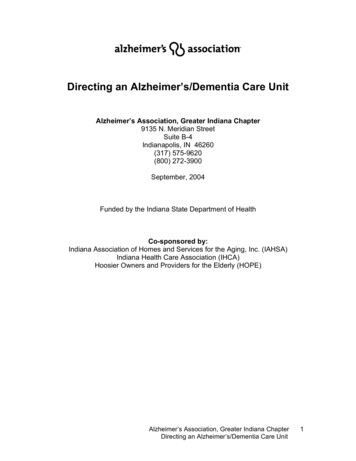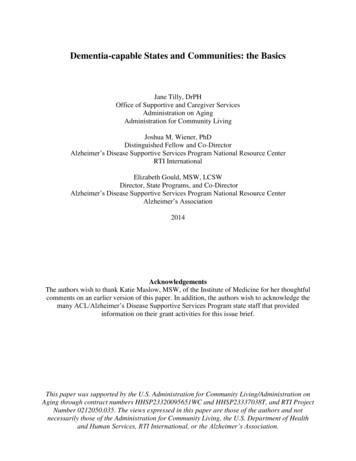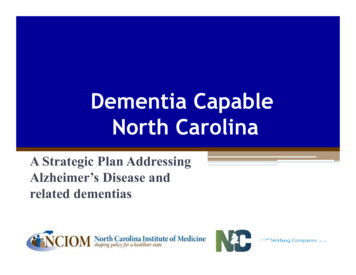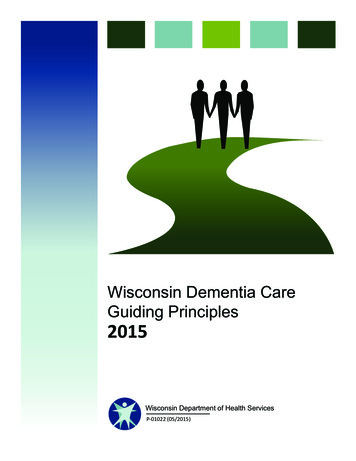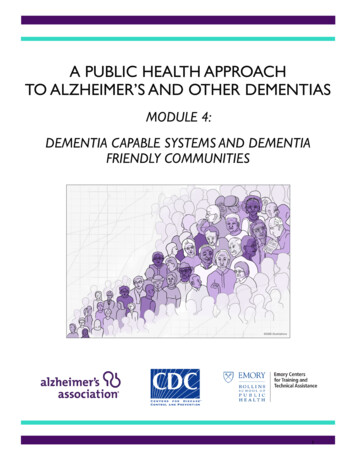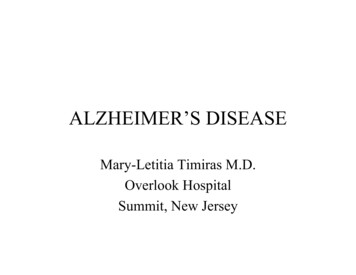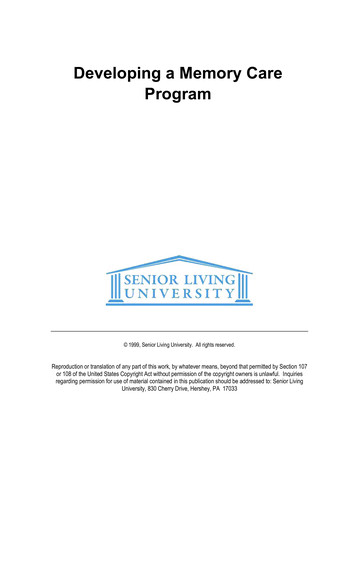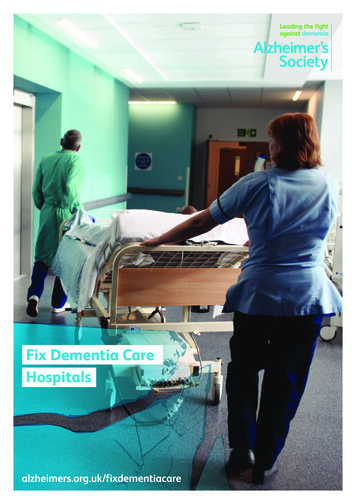
Transcription
Fix Dementia CareHospitals
DocumentpurposeFix Dementia Care: Hospitals marks the start of a newAlzheimer’s Society campaign looking at the experiences ofpeople affected by dementia in a range of health and caresettings. It contains the results of Freedom of Informationrequests from hospital trusts across England, a self-selectingsample of carers of people affected by dementia whocompleted a survey on Alzheimer’s Society’s Facebook pageand analysis of government and NHS data. It also includes thestories of four families affected by dementia who have hadexperience of dementia care in hospitals.It sets out recommendations for the NHS and health regulatorsto improve the experiences of people affected by dementia inhospitals and Alzheimer’s Society will be campaigning to ensurethey are implemented.TitleFix Dementia Care: HospitalsPublication dateJanuary 2016Target audiencesFix Dementia Care: Hospitals is intended for a wide range oforganisations and people who can improve quality of life forpeople affected by dementia. It is particularly aimed at centralgovernment, NHS bodies and regulators, and supporters ofAlzheimer’s Society campaigns.AcknowledgementsAlzheimer’s Society would like to thank Joyce, Jill, David, Annara,Kay, Sally-Ann and Geoff for telling us their stories and the carersof people affected by dementia who took part in the Facebooksurvey. Thanks also go to the many Alzheimer’s Society staff andothers who contributed to the report’s content.AuthorsAndrew Boaden, Senior Policy OfficerContactAlzheimer’s Society Policy and Public Affairs & Campaigning Teams canbe contacted on 020 7423 3500 or at mentiacarePublisher Alzheimer’s Society 2016. All rights reserved. No part of thiswork may be reproduced, downloaded, transmitted or stored inany medium without written permission of the publisher, exceptfor personal or educational use. Commercial use is prohibited.
3ContentsForeword4Summary6Fix Dementia Care: Key hospital statistics81 Introduction102 Admission123 Care in hospital144 Falls195 Discharge216 Conclusion: What needs to change247 Recommendations26Appendix 1: Report methodology29Appendix 2: References31
4ForewordPoor care in hospital can have devastating, lifechanging consequences for someone with dementia.Becoming malnourished because you cannotcommunicate to hospital staff that you are not eatingenough, or falling and breaking a hip because youweren’t helped to the toilet can mean the differencebetween being well enough to return to your ownhome or being discharged to a residential home.We place great trust in the NHS to take good care of us whenwe’re unwell and there are many examples of excellent care acrossthe country – some of which we showcase in this report – but ourinvestigation into hospital care in England for people with dementiareveals a less comforting picture. It is one that has been obscuredfrom the public by layers of bureaucracy, bad governance andweak regulation.Through Freedom of Information requests to hospitals and firsthand testimony collected from people with dementia, their familiesand carers, we have discovered evidence of the variable care thatpeople with dementia face – in some cases shockingly poor –and the hundreds of millions of pounds of public money wasteddelivering it.The standards of care differ so much around the country thatpeople are gambling with their health and wellbeing every time theyare admitted to hospital. At the moment, there’s no way for patientsor their relatives to find out in advance what kind of care they’regoing to get. This has to change.Lasting change will not be achieved through easy or quick solutionsso our recommendations are pragmatic to start us on a journey oftransformation. We’re calling on all hospital boards to publish anannual statement on the quality of dementia care in their hospitals,and on Care Quality Commission and Monitor to make the qualityof dementia care a priority in their regulation of hospitals.
5Putting this information in the public domain will finally put an endto a culture in which it is easier to find out about your local hospital’sfinances than the quality of care you’ll receive if you have dementia.It will allow us to stand together to collectively hold hospitals toaccount, ensuring the continued improvement of hospital care forpeople with dementia and better use of NHS budgets.This report marks the start of Alzheimer’s Society’s newFix Dementia Care campaign. During 2016 we will be examiningthe quality of dementia care in hospitals, care homes and care athome, addressing the issues that arise with ways to change policyand practice to ensure everyone gets the care they need, whateverthe setting.Jeremy Hughes CBEChief Executive
6SummaryThe Francis Inquiry into the Mid Staffordshire NHS Foundation Trust (The Mid StaffordshireNHS Foundation Trust Public Inquiry, 2013) reported the need for accountable leadershipand good governance to ensure good quality care in hospitals. The National audit ofdementia care in general hospitals (Royal College of Psychiatrists, 2013) built on theInquiry’s findings, recommending that hospitals should have a dementia strategy outliningtheir plans to improve dementia care, a dementia champion on the board and a definedprocess for the board to review the quality of dementia care. There should be a clear,personalised dementia care pathway from admission to discharge with an identified seniorclinician to oversee its implementation. All staff should be dementia aware; those deliveringcare should receive dementia training appropriate to their role and the hospital environmentshould be adapted to be dementia friendly.The Dementia Action Alliance (DAA), supported by Alzheimer’s Society, has led importantwork to develop good practice in line with these reports by securing hospitals’ commitmentto deliver the personalised dementia care outlined in the Dementia friendly hospital charter(Dementia Action Alliance, 2014) and National dementia declaration (Dementia ActionAlliance, 2010). We commend the hospitals involved in this work but more needs to be doneto improve practice. Our report has found that poor dementia care is still widespread, thatthe quality of care varies widely between hospitals and that millions of pounds are beingwasted on substandard care.We found that: only 2 per cent of those we surveyed felt that all hospital staff understood the specificneeds of people with dementia thousands of people with dementia are being discharged between the hours of11pm and 6am each year in the worst-performing hospitals, 52.2 to 70.6 per cent of people aged over 65 whohad a fall in hospital were people with dementia people with dementia stay five to seven times longer than other patients over theage of 65 in the worst-performing hospitals 264.2 million was wasted due to poor dementia care in hospitals in 2013/14.To truly fix dementia care in all hospitals will take time. The following recommendationsare intended to accelerate that transformation and complement those from theFrancis Inquiry and National Dementia Audit. They must be built into the forthcomingimplementation plan for the Prime Minister’s challenge on dementia 2020 (Departmentof Health, 2015) to ensure unified, system-wide change. Fundamental to our calls is theidea that, by making hospitals more transparent, they become more accountable and thismotivates improvement.
Summary 7Regulators need to do more to support this by improving the way they target inspectionsof dementia care in hospital and enforcing change where needed so that no one has toexperience poor quality care.Alzheimer’s Society calls for the following three recommendations. See section 8,‘Recommendations’, for further details on these:1. All hospitals to publish an annual statement of dementia careThis should include: satisfaction levels among patients with dementia and their carers figures showing the number of falls the number of inappropriate discharges, including those between 11pm and 6am,with less than 24 hours’ notice or with significant delays the number of emergency readmissions within 30 days the number of people who receive an appropriate assessment of health andwellbeing on arrival levels of staff and board dementia awareness and training the number of people with dementia being prescribed antipsychotic drugs examples of how care is being personalised (for example, use of Alzheimer's Society'sThis is me tool to understand a person’s needs and preferences) examples of integrated care (for example, employing dementia support workers).2. Monitor to use the annual dementia statement as part of itsRisk assessment framework to identify and take action in hospitalswhere dementia care is inadequate3. C are Quality Commission (CQC) to appoint a specialist dementiaadviser and include dementia care indicators as part of itsIntelligent Monitoring work to improve regulation of dementiaservices in hospital.
8Fix Dementia Care:Key hospital statisticsThis report is informed by Freedom of Information (FOI) requests ofNHS hospital trusts in England and a survey of 570 people affected bydementia. The findings from these investigations can be found below.Almost 60% of people we surveyedfelt the person with dementia they knowwasn’t treated with dignityor understanding while in hospital.92% of people we surveyedsaid hospital environments arefrightening for the personwith dementia they know.90% of people we surveyedsaid the person with dementia theyknow became more confusedwhile in hospital.There were 6,834 incidentsof people with dementiafalling in hospital last year.
Fix Dementia Care: Key hospital statistics 9Last year, 4,926 people withdementia were dischargedfrom hospital between thehours of 11pm and 6am.On average, people withdementia in hospital stay morethan twice as long as otherpatients aged over 65.Only 2% of those we surveyedsaid all hospital staffunderstood the needs ofpeople with dementia.At least 25% of hospitalbeds are occupied by peoplewith dementia.In 2013/14, 264.2mwas wasted on poordementia care in hospitals.
101 IntroductionThere are over 700,000 people with dementia in England, with this figure expected toincrease to around 850,000 by 2021 (Prince M, Knapp M et al, 2014). We know that themajority of people with dementia want to stay at home for as long as possible (Alzheimer’sSociety and YouGov, 2014). However, at some point during the course of their condition,people with dementia may need to access hospital services, either as a planned admissionor, as is more frequently the case, in an emergency.People are not generally admitted for their dementia. Some of the most common reasonspeople with dementia are admitted to hospital include falls, broken/fractured hips or hipreplacements, urinary tract infections, chest infections or stroke (Alzheimer’s Society, 2009).A significant number of these admissions could be avoided through better support in thecommunity and greater integration of health and social care services.In a reply to a written parliamentary question from MP Tracey Crouch (November 2014),figures from Department of Health revealed that people with dementia in hospital accountfor around 3.2 million bed days a year, with 25 per cent of hospital beds occupied bypeople with dementia at any one time. However, informal reports suggest this is a grossunderestimate, with some hospitals stating that 40 to 50 per cent of their patients havedementia.In Counting the cost, our report on hospital care (Alzheimer’s Society, 2009), we found thatpeople with dementia often leave hospital with poorer health and wellbeing than when theyarrived. Of the carers who responded to a survey for the report: 47 per cent said that being in hospital had a significant negative effect on the generalphysical health of the person with dementia, which wasn’t a direct result of the medicalcondition 54 per cent said that being in hospital had a significant negative effect on the person’sdementia symptoms, such as becoming more confused and less independent.The respondents told us that the longer people with dementia were in hospital, the worsethe effect on their dementia symptoms and their physical health. Hospital stays had ledto weight loss, incontinence, exhaustion, pressure sores, bruising, reduced mobility, loss ofcommunication skills and depression. Of the 60 per cent of people with dementia who wentinto hospital from their own home, only 36 per cent returned there, most of the rest weredischarged into residential care.
Introduction 11In 2015, we investigated further to understand people’s experiences of care that led to theseoutcomes. The results were alarming. In a Facebook poll of over 570 carers, families andfriends of people with dementia, we found that: only 2 per cent said that, in their experience, all hospital staff understood the specificneeds of people with dementia 57 per cent said they felt the person they care for was not treated with understandingand dignity in hospital 90 per cent said they felt the person with dementia became more confused whilein hospital 92 per cent thought hospital environments were frightening for the person with dementia.From this survey, we also heard instances of people with dementia being treated withexcessive force, of poor catheterisation leading to a urinary tract infection, of visits fromfamily members and carers being denied, and of people not being changed or cleaned upafter incontinency.This report examines the experience of people with dementia from admission to discharge.By telling the stories of four families and their experiences, we outline what needs to changein order to fix dementia care in hospitals.
122 AdmissionJoyce’s story: Hours of A&E agonyJoyce, 80, lives in a nursing home in Chester. She was diagnosed withAlzheimer’s disease in 2007.In 2014, Joyce fell in the nursing home and broke her pelvis. Her daughter Louisetook her to hospital, explained that she had fallen, and that her mum haddementia. They were forced to wait in a very busy A&E department for hours tobe seen. The environment was bright, noisy and people kept brushing past Joyce’swheelchair. Joyce became increasingly distressed, crying out loudly. Other peoplein the waiting room began to laugh and stare, with children asking questionsabout what was wrong with her.Louise said, ‘On our second trip to hospital last July, after Mum had aspirated,I was so worried about how she would cope because after the first visit shewas not herself for a long time. Once she was given the all-clear we had troublegetting Mum a drink as she needs thickened liquid to help her swallow. The A&Edepartment didn't have any thickener available for Mum to be able to have a drink.'On both trips into hospital I found myself having to constantly (and discreetly)explain to different staff that Mum had dementia. When Mum was admittedto A&E it was very distressing for both of us. It would have been less stressfulif we could have waited in a quiet room away from the noise and onlookers.Hospitals need to be more dementia friendly and make sure all staff are awareof that person's needs and how their dementia might affect them.’Joyce, living with dementia
Admission 13People with dementia are generally admitted to hospital to be treated for an injury oranother condition, rather than because of their dementia. Memory loss, difficulties withcommunication, low mood, agitation, cognitive issues and frailty can make it harder for staffto understand the extent of the problem and offer the appropriate treatment and support.A proper assessment of their needs on arrival is key to someone with dementia receivingappropriate care during their visit to hospital. However, many hospitals are not set upto deliver this quickly and sensitively, leaving people with dementia waiting in freneticenvironments which they can find stressful and traumatic.Putting it right: Fast-tracking admissionHospital staff should identify people who have dementia or suspecteddementia as quickly as possible and fast-track their assessment, so theycan avoid a distressing wait in a dementia-unfriendly environment.Dementia awareness and training is essential to enable staff to triagepeople with dementia appropriately, communicating with them, theirfamilies and carers to understand their needs and offer appropriate care.Hospitals are not only expected, but financially incentivised, to ensure at least 90 per centof patients over 75 are screened for dementia on admission to hospital, and that thesepatients have a comprehensive assessment of their health and wellbeing, with referralsmade to specialist services for follow-up as required. The assessment should consider theviews of the person’s family or carer and their care plan to get the full picture.However, even with these financial incentives, the most recent figures show that only69 per cent of hospital trusts were doing this properly. While this was an increase of14 per cent on the previous year, it means 46 hospitals were not delivering these basicminimum standards of care on admission. Additionally, and more alarmingly, the threepoorest-performing hospitals were only screening, assessing and referring between 28 and43 per cent of people admitted (NHS England, 2015).Hospitals need to take urgent action to redesign admission pathways so people withdementia don’t have to wait for long periods of time in traumatising A&E environments andto ensure that they get a timely, comprehensive assessment of their needs.
143 Care in hospitalDavid’s story: When care is not personalisedJill’s stepfather, David, is 64 and has frontotemporal dementia. He wasadmitted to hospital because of an agonising mouth abscess, which haddeveloped during a long wait for an appointment to have two teeth removed.He became distressed and aggressive because of the pain, but when staff athis care home called for an ambulance, they were shocked when two policevans arrived to collect him.Jill, who is from Denton, Greater Manchester, rushed to the home after shewas told what had happened. She insisted that her father be taken to hospitalin an ambulance. When he arrived there he was taken to a medical assessmentunit and Jill explained why her father was so distressed. ‘I expected them todeal with his abscess as soon as possible, but he ended up being in hospital formonths being moved from ward to ward,’ she says.After six days on the medical assessment unit, David was moved to a generalward, which Jill describes as ‘horrendous’. She says, ‘It was an absolutenightmare. They kept forgetting to give him his medication and didn’t knowhow to deal with him. One time I went in to visit and four or five nurses wererunning around the ward after him – it was like a ‘Carry on’ film. He endedup with bruises on his arms after being grabbed by two big security guards.Dad used to become agitated because staff were trying to stop him roamingaround picking things up, but all they had to do was sit him down and talk tohim to calm him down.’Jill and David, living with dementia
Care in hospital 15David’s aggressive behaviour continued to be a challenge for hospital staff.During one visit, Jill arrived to find that police had handcuffed her father to thebed. A nurse told her he had pushed over a piece of hospital equipment and couldbe charged with criminal damage. Jill says, ‘I was appalled. My father is a sick manbut they were treating him like a criminal. It was ridiculous.’ By the time David wasmoved to a dementia unit a week later, he had already lost a considerable amountof weight as staff had failed to monitor his eating and drinking.She says there was a ‘vast’ difference in the care provided on the dementia unit,and it was even better after she contacted the rapid assessment interface anddischarge (RAID) psychiatric team at the hospital, which oversees the care ofpeople with dementia. ‘As soon as my dad was admitted I rang RAID, a schemethat the community psychiatric nurse had told me about, and someone from theteam came to see Dad three times a day,’ she says. ‘The lady from the team wasreally nice, she was able to talk to the doctors and nurses for me and tried her bestto make sure Dad was getting the right kind of care.’David remained in hospital for four months waiting for surgery to remove his teeth.His operation was cancelled when he contracted the bacterial infection Clostridiumdifficile, and he was told he would have to return to the main hospital as he wasat risk of developing septicaemia. After two more cancellations he finally hadhis operation – 11 months after seeing the dentist – by which time his teeth haddecayed so much the surgeon needed to remove seven teeth rather than two.It is clear that too often hospitals are frightening and disorientating for people withdementia, as well as being places where their overall health and wellbeing often deterioratesrather than improves. A dementia-trained workforce working within dementia-friendlyhospital environments can dramatically improve someone’s stay in hospital. However, weknow that the majority of people with dementia want to stay at home, in the community,so it is important that people with dementia are able to leave hospital as soon as they aresafe and well enough to do so (Alzheimer's Society and YouGov, 2014).
16 Care in hospitalPutting it right: Dementia support workersTo improve the experience of people with dementia and their carers inhospital, Leicester Royal Infirmary employs Alzheimer’s Society dementiasupport workers to provide practical and emotional support for peoplewith dementia and their families and carers before, during and followinga stay in hospital. The support workers talk through any concernsthat people with dementia and carers may have and provide tailoredinformation and guidance on how to live well with dementia. They liaisewith hospital staff so that they understand an individual’s needs and arebetter able to care for them.They help patients and carers to understand the hospital process, forexample which staff members they might be in contact with or thehospital discharge process, and provide details of local support servicesavailable in the community when patients leave hospital. This vastlyimproves the quality of someone’s stay and ensures they are wellsupported in the community once they leave, helping prevent avoidablereadmissions to hospital in the future.Putting it right: Dementia-friendly environmentsThe hospital environment can be confusing and disorientating for peoplewith dementia. Through its Enhancing the healing environment project,The King’s Fund found that changes to the physical environment canreduce falls and aggressive behaviour, improve staff recruitment andretention, and reduce overall costs.Bradford Royal Infirmary has undertaken important work to make theirhospital more dementia friendly. In the elderly care ward, the bland whitewalls of the bays and corridors have been painted with bold colours.Cinema seats provide spaces to watch films from the local archive and anoffice has been turned into a memory café where people can enjoy teain the afternoon. On the orthopaedic ward, patients and visitors can alsoenjoy photographs of local scenes that encourage socialising and promptmemories. Social dining is encouraged in bed bays and new lightingschemes are being trialled to aid sleep patterns. These enhancementshave improved patient wellbeing, enabling people with dementia to findtheir way around and reducing agitation.
Care in hospital 17Putting it right: A dementia-friendly workforceIt is vital that hospital staff at all levels, including porters, nurses, doctorsand specialists, have a general knowledge and awareness of dementia.For staff who provide direct clinical care, an appropriate level of dementiatraining is essential so that they are able to understand people’sindividual complex needs, including being able to determine whether theyare in pain, in need of help, hungry, thirsty or simply uncomfortable.At a national level, dementia awareness and training is being deliveredthrough Health Education England’s (HEE’s) Dementia AwarenessTraining programme, which defines three levels of core competency: T ier 1 – awareness-raising in terms of knowledge, skills and attitudesfor all those working in health and care Tier 2 – developing the knowledge, skills and attitudes of staff whohave regular contact with people living with dementia Tier 3 – enhancing the knowledge, skills and attitudes of key staff(experts) who work with people living with dementia, designed tosupport them to play leadership roles.As of April 2015, HEE had provided tier 1 and tier 2 dementia trainingto 515,967 NHS staff, exceeding government targets, with the aim ofembedding the training into ‘business as usual’. Most of the training wasat tier 1. Going forward, there needs to be a greater focus on rolling outtier 2 and 3 training to ensure that NHS staff continue to receive themost advanced support available.
18 Care in hospitalPutting it right: Personalising careAlzheimer’s Society developed This is me, a leaflet for use across caresettings for people with dementia to provide background information ontheir needs, preferences, likes, dislikes and interests. It can also provideinformation about other conditions they might have. This informationenables clinical staff to see the person as an individual and deliverperson-centred care tailored specifically to their needs. It can helpovercome problems with communication, preventing issues such asmalnutrition and dehydration.Carers play an important role in ensuring people with dementia get theright care and support. Traditionally, however, carers have been limited tohospital visiting hours. John’s campaign, founded in 2014, calls for carersto have the right to stay with people with dementia throughout their timein hospital. Over 200 hospitals have already signed up to the campaign,enabling carers to be there when they are needed most, contributing keyinformation and support to ensure the person with dementia’s needs andpreferences are met.While dementia symptoms such as memory loss, difficulties communicating, low mood,agitation, cognitive issues and frailty can make a person’s care needs more complex,this does not justify our findings that people with dementia tend to stay in hospitalmore than twice as long as other people over the age of 65. Our Freedom of Informationrequests showed that last year the average length of stay for someone over 65 was5.5 days, whereas for people with dementia it was 11.8 days (FOI request, 2015 – responsefrom 73 trusts).However these issues can be avoided and in many places they are. Last year, in thebest-performing hospitals, the length of time people with dementia stayed was the sameor only marginally longer than the length of stay for people over 65 without dementia.However, in the three worst-performing hospitals people with dementia stayed betweenfive and seven times as long as other people over 65. The average stay in some ofthese hospitals for people with dementia was between 21.8 and 24.7 days (FOI request,2015 – response from 73 trusts).These extended stays and the variation between hospitals are unacceptable. The personwith dementia suffers and it is expensive for the NHS. In 2013/14, excess days spent inhospital by people with dementia were estimated to have cost the NHS at least 155.3million (CHKS, 2015). This is a shocking waste of millions of pounds – money that could befar better used supporting people to stay independent and healthy in their own homes.This issue must be addressed.
194 FallsAnnara’s story: A fatal fallIn March 2014, during a stay in hospital, Annara’s mother, Iris, fell out ofbed and landed directly on her face, leaving a deep cut and severe bruising.Annara called the hospital and was told Iris had experienced a minor falland had a slight cut on her head.When Annara’s sister, Hazel, visited her mother, she found her heavily bandagedwith purple bruising around her chin and eyes. They believe Iris must have injuredher mouth, as the inside was black.Annara asked the hospital staff to explain how her mum had fallen out of bed,but this was never provided. When Iris returned home, there was no mention ofthe fall on the medical notes and no follow up with the GP had been arranged.Iris started getting dizzy spells and stopped eating and drinking. She passed awayon 31 July 2014.Annara said: ‘Mum was never the same after she fell in hospital. She startedgetting dizzy spells, hardly drank or ate, was nearly always in bed and found it hardto follow simple instructions. I was astounded it was dismissed as minor incident– told by hospital staff she had a “slight cut on her head.” You expect to come outof hospital feeling better, not in a worse state than when you went in. The entireepisode has left our family broken. I am in no doubt it contributed to Mum’s deaththree months later.’Annara
20 FallsA key marker of the quality of care someone receives in hospital is the likelihood of themhaving a fall during their stay. Inconsistent hospital recording of the numbers of peoplewith dementia who have fallen means this data was only available for a quarter of hospitals,but, even in this small sample, 6,834 falls were reported last year. In these hospitals, 28.3 percent of people aged over 65 who had a fall were people with dementia, but these numberswere as high as 52.2 to 70.6 per cent in the three worst-performing hospitals (FOI request,2015 – response from 38 trusts).On average, people with dementia spend nearly four times as long in hospital followinga fall (CHKS, 2015). The resulting frailty and an extended stay in hospital can increase thelikelihood of them going into a residential home or worse.Putting it right: preventing fallsThere will always be occasions where patients experience a fall whilein hospi
dementia care in general hospitals (Royal College of Psychiatrists, 2013) built on the Inquiry's findings, recommending that hospitals should have a dementia strategy outlining their plans to improve dementia care, a dementia champion on the board and a defined process for the board to review the quality of dementia care. There should be a clear,
